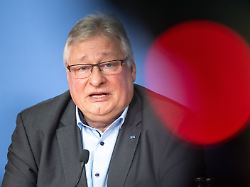If Bahn invites to proceedings
EVG: We certainly wouldn’t refuse arbitration
06/23/2023 10:59 am
The rail and transport union calls its members to vote on an indefinite strike. At the same time, the employee representatives are now ready for arbitration proceedings. It sounded different the day before.
The railway and transport union (EVG) is open to arbitration despite the course for further strikes at the railways in the wage dispute. “We are ready to talk day and night,” said chairman Martin Burkert to Bayerischer Rundfunk. “If the employer approaches us with a request for arbitration, we can make a decision quickly.” The union will certainly not refuse arbitration.
“Everyone knows my phone number, as does our negotiation leader,” said Burkert. “It is always possible to come back to the negotiating table.” After the failure of collective bargaining, the EVG announced that it would let its 110,000 members at Deutsche Bahn decide on indefinite strikes in a ballot. Warning strikes are also still possible in the coming weeks. Burkert emphasized that the union had enough money for this. “We had our last indefinite strike 31 years ago. The strike fund is well stocked.” Striking union members receive money from this fund if the employer no longer pays.
On Thursday, EVG negotiator Kristian Loroch said to the question of whether the union would get involved in an arbitration procedure parallel to the ballot: “You can basically imagine a lot. But today we decided something different, and we’ll do that for now continue on our way.”
“People need more money immediately”
Burkert now said that the EVG was not “crazy”. You deal responsibly with the right to stop work. “People need more money immediately,” Burkert criticized Deutsche Bahn’s offer for a first tariff increase in December. The offered term of 27 months is too long.
Labor Minister Hubertus Heil is also hoping for a willingness to compromise. “I rely on insight and reason,” said Heil on Deutschlandfunk. It is important to find a fair balance of interests. The SPD politician said that a compromise can “never be a dirty word” in a democracy. Negotiations always took two. However, the Basic Law states that the state is not allowed to intervene directly in such collective bargaining conflicts, stressed Heil.
